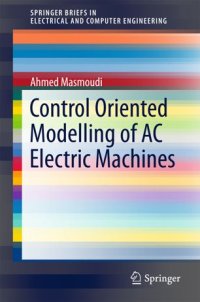
Ebook: Control Oriented Modelling of AC Electric Machines
Author: Ahmed Masmoudi
- Tags: Engineering, Power Electronics Electrical Machines and Networks, Control
- Series: SpringerBriefs in Electrical and Computer Engineering
- Year: 2018
- Publisher: Springer Singapore
- Edition: 1st ed.
- Language: English
- pdf
The book discusses the modeling of induction and synchronous machines aimed at the synthesis of dedicated control strategies.
The first part focuses on induction machines (IMs), and starts with the analysis of the principle of operation, which is based on the induction phenomenon. It then establishes the a-b-c model, assuming a sinusoidal spatial repartition of the air gap flux density, a linear magnetic circuit, and constant phase resistors. The a-b-c model enables the establishment of a state representation of the induction machine. Then, the Park transformation is introduced and applied to the IM a-b-c model, leading to its Park one, which is then used to analyze the IM steady-state operation. The chapter also includes a case study dealing with the doubly fed induction machine, which is widely integrated in wind power generating systems.
Following the introduction of the continuous development of synchronous machines (SMs), the second part establishes the a-b-c model for salient pole machines. Then, the Park transformation is applied to the established a-b-c model, leading to the Park one. The section highlights the formulation and analysis of the electromagnetic torque, with its synchronizing and reluctant components investigated in terms of the torque angle. Subsequently, it characterizes the operation at (i) maximum torque and (ii) unity power factor before focusing on the flux weakening approaches that could be implemented in SMs considering both smooth and salient pole topologies. Lastly, it presents a case study dealing with an investigation of the main features of the electric drive unit of a hybrid propulsion system and the possibility of their improvement, with an emphasis on the extension of the flux weakening range.